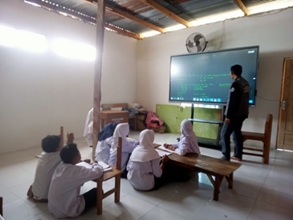Coaching of English Class: Meningkatkan Kemampuan Kosa Kata Berbahasa Inggris Siswa Menggunakan Media Smart TV Coaching of English Class: Improving Students' English Vocabulary Skills Using Smart TV Media
Main Article Content
Abstract
This community service program aims to increase students' motivation, focus, and proficiency in English. This service program emphasizes writing and speaking skills, especially mastery of basic sentence-level English vocabulary through Smart TV media. Students prepare teaching and learning activities and offer teaching in the form of material. Students are prepared to receive relevant and meaningful training activities to develop motivation and English language skills through the use of interesting and communicative audio-visual teaching media. The PKM results aim to strengthen students' ability to master English vocabulary on the topic or material being taught, considering the importance of English for students at MTs Sinoa. In addition, this service program allows students to improve their English through more modern media and attractive visuals.
Downloads
Article Details

This work is licensed under a Creative Commons Attribution-ShareAlike 4.0 International License.
Authors who publish with this journal agree to the following terms:
- Any article on the copyright is retained by the author(s).
- Author grant the journal, right of first publication with the work simultaneously licensed under a Creative Commons Attribution License that allows others to share work with acknowledgment of the work authors and initial publications in this journal.
- Authors are able to enter into a separate, additional contractual arrangements for non-exclusive distribution of published articles of work (eg, post-institutional repository) or publish it in a book, with acknowledgment of its initial publication in this journal.
- Authors are permitted and encouraged to post their work online (e.g., in institutional repositories or on their websites) prior to and during the submission process, as can lead to productive exchanges, as well as earlier and greater citation of published work.
- The article and any associated published material is distributed under the Creative Commons Attribution-ShareAlike 4.0 International License
References
REFERENSI
Aliyyah Bilqis Ramadhianti, Jazari, S. J. (2020). This work is licensed under Creative Commons Attribution Non Commercial 4.0 International License . Jurnal Ilmiah Pendidikan Dasar Islam, 4(2), 40–49.
Anwar. (2023). Manajemen Multimedia Berbasis Smart TV Terhadap Peningkatan Motivasi Belajar Siswa. Kelola, 8 (2) https://doi.org/10.24256/kelola.v8i2.4071
Astiti, D. A., & Sumarno, A. (2016). Pengembangan Media CAI Untuk Meningkatkan Kemampuan Siswa Dalam Mengucapkan Kosakata Bahasa Inggris Dalam Pembelajaran Bahasa Inggris Kelas III di SDN Krian 02. 1–10. Jurnal Mahasiswa Teknologi Pendidikan, 07 (01).
Dahliana, F. H. dan. (2019). Penerapan Media Televisi Pintar untuk Meningkatkan Kemampuan Keaksaraan Anak Kelompok B2 TK Cut Mutia Banda Aceh. Jurnal Buah Hati, 6(2), 135–144.
Haetami, A., Judijanto, L., Dewi, A. E. R., Happy, N., Terok, F. S., & Jakob, J. C. (2024). The effect of REACT model implementation on learning outcomes and critical thinking skills of students of SMAN 9 KENDARI. Journal of Infrastructure, Policy and Development, 8(13), 7574.
Khasanah, Maulana Muhlas, dan L. M. (2020). Development of E-Learning Smart Apps Creator (SAC) Learning Media for Selling Employees on Paid TV. Akademika: Jurnal Teknologi Pendidikan, 9(2), 129–142.
Kusuma, Amier Daien Indra, Pengantar Ilmu Pendidikan. Surabaya: Usaha Nasional, 1973.
Miles, M. B., & Huberman, A. M. (2009). Analisis Data Kualitatif. UI-Press.
Mustofa, P. P. dan M. (2020). EFL Learning Via Smart TV in Junior High School. https://doi.org/https://doi.org/10.33503/prosiding.v1i01.981
Pasambo, E., & Radia, E. H. (2022). Meta Analisis Pengaruh Multimedia Sebagai Media Pembelajaran Terhadap Hasil Belajar Matematika Siswa Sekolah Dasar. Jurnal Basicedu, 6(3), 3257–3267. https://doi.org/10.31004/basicedu.v6i3.2533
Persulessy, S. I., Nikijuluw, R. P. V., & Jakob, J. C. (2024). Utilizing Artificial Intelligence in Language Learning: What About Engineering Students’ Perception?. Journal of English Education Program, 5(1). http://dx.doi.org/10.26418/jeep.v5i1.71159 .
Shin, D.-H., Hwang, Y., & Choo, H. (2013). Smart TV: Are They Really Smart in Interacting with People? Understanding The Interactivity of Korean Smart TV. Behaviour & Information Technology, 32(2), 156–172. https://doi.org/10.1080/0144929X.2013.782842
Sugiyono. (2016). Metode Penelitian Kuantitatif, Kualitatif dan R&D. Alfabeta.
